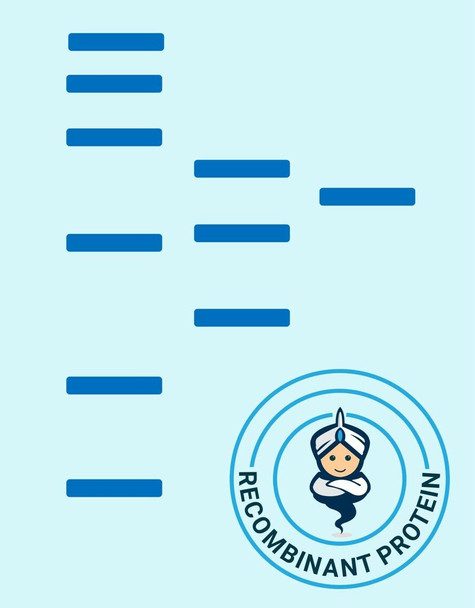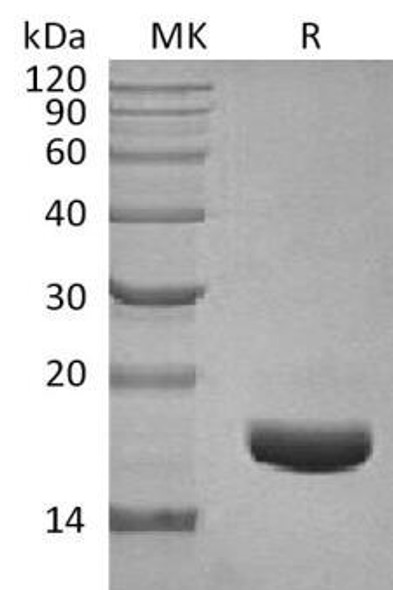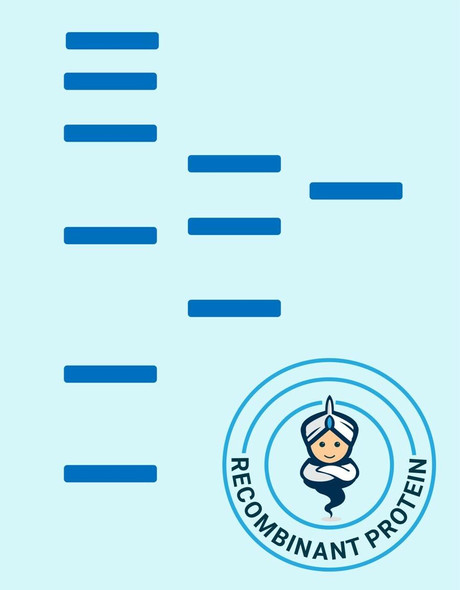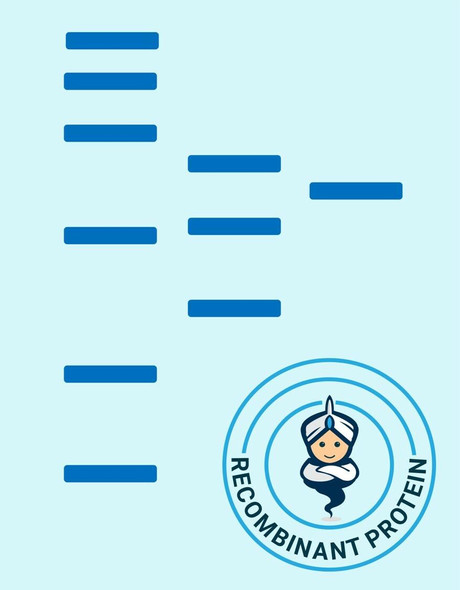Description
| Product Name: | Human CTGF Recombinant Protein |
| Product Code: | RPPB0147 |
| Size: | 10µg |
| Species: | Human |
| Target: | CTGF |
| Synonyms: | CCN2, NOV2, HCS24, IGFBP8, MGC102839, CTGF. |
| Source: | HEK293 Cells |
| Physical Appearance: | Filtered colorless solution. |
| Formulation: | CTGF filtered (0.2�m) solution in 0.1M Citrate buffer pH 4.7�and 20% (w/v) glycerol. |
| Stability: | Store at 4°C if entire vial will be used within 2-4 weeks. Store, frozen at -20°C for longer periods of time. For long term storage it is recommended to add a carrier protein (0.1% HSA or BSA).Avoid multiple freeze-thaw cycles. |
| Purity: | Greater than 90.0% as determined by SDS-PAGE. |
| Amino Acid Sequence: | QNCSGPCRCP DEPAPRCPAG VSLVLDGCGC CRVCAKQLGE LCTERDPCDP HKGLFCHFGS PANRKIGVCT AKDGAPCIFG GTVYRSGESF QSSCKYQCTC LDGAVGCMPL CSMDVRLPSP DCPFPRRVKL PGKCCEEWVC DEPKDQTVVG PALAAYRLED TFGPDPTMIR ANCLVQTTEW SACSKTCGMG ISTRVTNDNA SCRLEKQSRL CMVRPCEADL EENIKKGKKC IRTPKISKPI KFELSGCTSM KTYRAKFCGV CTDGRCCTPH RTTTLPVEFK CPDGEVMKKN MMFIKTCACH YNCPGDNDIF ESLYYRKMYG DMA HHHHHH |
Connective Tissue Growth Factor belongs to the CCN family of proteins. The CCN family presently consists of six members in human also known as: Cyr61 (Cystein rich 61), CTGF (Connective Tissue Growth Factor), Nov (Nephroblastoma Overexpressed gene), WISP-1, 2 and 3 (Wnt-1 Induced Secreted Proteins). The CCN genes encode secreted proteins associated with the Extracellular Matrix (ECM) and cell membrane.CCN proteins are matricellular proteins which are involved in the regulation of various cellular functions including: proliferation, differentiation, survival, adhesion and migration. They are expressed in derivatives of the three embryonic sheets and are implicated in the development of kidney, nervous system, muscle, bone marrow, cartilage and bone. During adulthood, they are implicated in wound healing, bone fracture repair, and pathologies such as: fibrosis, vascular ailments and tumorigenesis.Full length secreted CCN proteins can show an antiproliferative activity, whereas truncated isoforms are likely to stimulate proliferation and behave as oncogenes.The full length protein consists of four modules: Module I shares partial identity with the N-terminal part of the Insulin-like Growth Factor Binding Proteins (IGFBPs).Module II includes a stretch of 70amino acid residues � which shares sequence identity with the Von Willebrand Factor Type C repeat (VWC).Module III contains sequences sharing identity with the Thrombospondin type 1 repeat (TSP1) (WSXCSXXCG), which is thought to be implicated in the binding of sulfated glycoconjugates and to be important for cell adhesion.Module IV, also designated CT, is encoded by exon5. It is the leasts conserved one of the four domains at the level of nucleotide sequence, but it appears to be critical for several of the biological functions attributed to the CCN proteins. Module IV resembles the CT domain of several extracellular protein including, Von Willebrand's factor and mucins. Sequence similarities to heparin-binding motifs are also found within this domain.Proteolysis of the secreted full-length CCN proteins that has been reported in the case of CCN2 and CCN3 might result in the production of CCN-derived peptides with high affinity for ligands that full-length CNN proteins bind only poorly. Amino-truncated CCN2 isoforms were biologically active whereas no specific biological activity has been attributed to the truncated CCN3. Although the molecular processes underlying the production of these secreted isoforms is presently unknown, it is important to note that proteolysis occur at the same amino acid residues in both CCN2 and CCN3. An elevated expression of CCN2 has also been detected by Northern blotting in human invasive mammary ductal carcinomas, dermatofibromas, pyogenic granuloma, endothelial cells of angiolipomas and angioleiomyomas, and in pancreatic tumors. A study performed with chondrosarcomas representative of various histological grades established that CCN2 expression was closely correlated with increasing levels of malignancy.In agreement with CCN2 playing a role in brain tumor angiogenesis, immunocytochemistry studies indicated that both glioblastoma tumor cells and proliferating endothelial cells stained positive for CCN2. In astrocytomas, CCN2 expression was particularly elevated in high grade tumors, with a marked effect of CCN2 on cell proliferation. Downregulation of CCN2 expression in these cells was associated with a growth arrest at the G1/S transition while over-expression of CCN2 induced a two-fold increase of the number of cells in the G1 phase. Gene profiling analysis allowed to identify a set of about 50 genes whose expression might account for the proliferative activity of CCN2 in these cells.CCN2 was seen in a higher proportion of mononuclear cells of patients with acute lymphoblastic leukemia.
The CTGF Human Recombinant produced in HEK293 cells, is 36kDa protein containing a total of 329 amino acid residues (aa 27-349) including a C-terminal 6�His tag.
| UniProt Protein Function: | CTGF: Major connective tissue mitoattractant secreted by vascular endothelial cells. Promotes proliferation and differentiation of chondrocytes. Mediates heparin- and divalent cation-dependent cell adhesion in many cell types including fibroblasts, myofibroblasts, endothelial and epithelial cells. Enhances fibroblast growth factor-induced DNA synthesis. Belongs to the CCN family. 2 isoforms of the human protein are produced by alternative splicing. |
| UniProt Protein Details: | Protein type:Cell adhesion; Secreted; Secreted, signal peptide Chromosomal Location of Human Ortholog: 6q23.2 Cellular Component: extracellular region; Golgi apparatus; intracellular membrane-bound organelle; plasma membrane Molecular Function:protein binding; protein C-terminus binding Biological Process: epidermis development; positive regulation of cell differentiation; positive regulation of JNK cascade; positive regulation of stress fiber formation; response to wounding; transcription initiation from RNA polymerase II promoter |
| NCBI Summary: | The protein encoded by this gene is a mitogen that is secreted by vascular endothelial cells. The encoded protein plays a role in chondrocyte proliferation and differentiation, cell adhesion in many cell types, and is related to platelet-derived growth factor. Certain polymorphisms in this gene have been linked with a higher incidence of systemic sclerosis. [provided by RefSeq, Nov 2009] |
| UniProt Code: | P29279 |
| NCBI GenInfo Identifier: | 116241320 |
| NCBI Gene ID: | 1490 |
| NCBI Accession: | P29279.2 |
| UniProt Secondary Accession: | P29279,Q6LCY0, Q96A79, Q96QX2, Q9UDL6, E1P578, |
| UniProt Related Accession: | P29279 |
| Molecular Weight: | 38kDa |
| NCBI Full Name: | Connective tissue growth factor |
| NCBI Synonym Full Names: | connective tissue growth factor |
| NCBI Official Symbol: | CTGF�� |
| NCBI Official Synonym Symbols: | CCN2; NOV2; HCS24; IGFBP8�� |
| NCBI Protein Information: | connective tissue growth factor |
| UniProt Protein Name: | Connective tissue growth factor |
| UniProt Synonym Protein Names: | CCN family member 2; Hypertrophic chondrocyte-specific protein 24; Insulin-like growth factor-binding protein 8; IBP-8; IGF-binding protein 8; IGFBP-8 |
| Protein Family: | Connective tissue growth factor |
| UniProt Gene Name: | CTGF�� |









